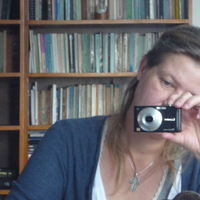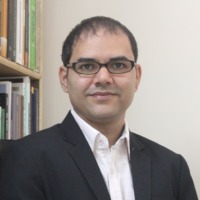
Kamala Kanta Dash
Joined Sri Sri University in April 2014 to work at the Faculty of Good Governance and Public Policy.
As a Founding Member and Faculty at the newly established School of International Studies (SIS), Ravenshaw University, Cuttack, Odisha, India, I teach International Relations Theory and coordinate the MA Course in Politics and International Relations.
As an Ambassador at the Parliament of World's Religions (PWR) Chicago, I advocate inter-religious dialogue in India and Australia. As a Carnegie New Leader (CNL) at the Carnegie Council for Ethics in International Affairs, New York, I have keen interest to study and promote Ethics in Global Politics.
In my PhD work at Monash (2008-2014) I am investigating the role of community engagement in public policy, my research specifically is concerned with the place and role of communities in the evolving policing models that are being in operation in the post 9/11 years to counter radicalization and terrorism. In this backdrop how the police agencies engage with their respective communities especially with the Muslim communities is the central focus of my thesis. I am looking at the cases of Victoria Police of Australia and Delhi Police of India to gain insight to the process of their community engagement models. This project crosses the traditional boundaries of disciplines and engages with the criminology, law, sociology, politics and above all public policy.
I did my Bachelors in Philosophy and Political Science from Utkal University, Masters in Political Science and World Affairs from Ravenshaw and MPhil in International Relations from JNU. I visited Australian universities as an Australia-India Council Fellow in 2006-2007 to research on "state and civil society partnership in fighting terrorism."
LinkedIn: http://www.linkedin.com/in/kamalakantadash
Subject Interest:
Political Science, International Relations, Philosophy, Public Policy and Development Studies
Areas of Interest:
International Relations
Community Engagement in Public Policy
Citizen participation in governance
Post-Colonial Criminal Justice System
Police in the criminal justice system
Policing in democracy
Community Policing
Policing in India and Australia
Policing Minorities and Refugees
Policing Insurgency and Terrorism
Islam and democracy
Interfaith in the age of terrorism
Religious Dialogue
Religious and Communal conflict
International Policing- Interpol, Europol and UN-Police
Supervisors: Prof Marika Vicziany and Assoc. Prof. Pete Lentini
Address: Monash Asia Institute, Level-5, Building-H, Caulfiled Campus, Monash University
As a Founding Member and Faculty at the newly established School of International Studies (SIS), Ravenshaw University, Cuttack, Odisha, India, I teach International Relations Theory and coordinate the MA Course in Politics and International Relations.
As an Ambassador at the Parliament of World's Religions (PWR) Chicago, I advocate inter-religious dialogue in India and Australia. As a Carnegie New Leader (CNL) at the Carnegie Council for Ethics in International Affairs, New York, I have keen interest to study and promote Ethics in Global Politics.
In my PhD work at Monash (2008-2014) I am investigating the role of community engagement in public policy, my research specifically is concerned with the place and role of communities in the evolving policing models that are being in operation in the post 9/11 years to counter radicalization and terrorism. In this backdrop how the police agencies engage with their respective communities especially with the Muslim communities is the central focus of my thesis. I am looking at the cases of Victoria Police of Australia and Delhi Police of India to gain insight to the process of their community engagement models. This project crosses the traditional boundaries of disciplines and engages with the criminology, law, sociology, politics and above all public policy.
I did my Bachelors in Philosophy and Political Science from Utkal University, Masters in Political Science and World Affairs from Ravenshaw and MPhil in International Relations from JNU. I visited Australian universities as an Australia-India Council Fellow in 2006-2007 to research on "state and civil society partnership in fighting terrorism."
LinkedIn: http://www.linkedin.com/in/kamalakantadash
Subject Interest:
Political Science, International Relations, Philosophy, Public Policy and Development Studies
Areas of Interest:
International Relations
Community Engagement in Public Policy
Citizen participation in governance
Post-Colonial Criminal Justice System
Police in the criminal justice system
Policing in democracy
Community Policing
Policing in India and Australia
Policing Minorities and Refugees
Policing Insurgency and Terrorism
Islam and democracy
Interfaith in the age of terrorism
Religious Dialogue
Religious and Communal conflict
International Policing- Interpol, Europol and UN-Police
Supervisors: Prof Marika Vicziany and Assoc. Prof. Pete Lentini
Address: Monash Asia Institute, Level-5, Building-H, Caulfiled Campus, Monash University
less
Related Authors
Maya Mirchandani
Ashoka University
Mohamed-Imtiyaz Abdul-Razak
Temple University
Britta Ohm
University of Mainz (Germany)
Amrita Ibrahim
Georgetown University
Taberez A Neyazi
National University of Singapore
W. Y. Alice Chan
McGill University
Arshi Saleem Hashmi PhD
National Defence University-NDU- Islamabad- Pakistan
InterestsView All (35)









Uploads
Papers by Kamala Kanta Dash
What does this mean? How will it impact the United States-Pakistan relations? Will India gain anything out of it? Though there are no easy and exact answers, there is still merit in attempting to find out possible answers to these three questions.
Will the Syrian refugees be given asylum by Europe? Which country will do what? How will the US respond? This lecture will sharply focus at the ongoing developments of the Syrian Refugee Crisis and locate the role that the institutions and countries like United Nations, European Union, United States, Russia and China have played. The presentation will also deal with the questions like what legal mechanisms exist to deal with such crises and what has been done in the past. Taking Syria as a case study the author will discuss the efficacy of International Humanitarian Law and the approaches like Responsibility to Protect.
the capital city and the counter-terror discourses in India. The police resorted to hard power as the primary rather than the last resort and this has further alienated many Muslims. Could better approaches be applied? This paper considers the social cohesion and the community resilience models."
Commission (ARC) of the Government of India. These three documents are carefully analysed to see whether Indian authorities appreciate the new approaches to counterterrorism
or whether they are still locked into old ideas of policing.
Kamala Kanta has been working with OdishaDiary (OD) since its inception in 2005 and has been one of the core team members in shaping the journey of OD in last seven years. Last year he along with the innovative OD team played an important role in establishing Odisha Living Legend Award, a novel way of recognising great individual and community contributions to Odisha in different walks of life. This year in 2012 Mr. Dash along with our editor Mr. Rashmi r. Parida conceptualised and added a brand new idea "Odisha Youth Inspiration Awards" to the already famous Living Legend Awards. The Youth Inspiration Awards are targeted at the young achievers of the state of Odisha which aims at making them the future legends by providing a single platform to the Legends and the Youth Inspirations.
On the eve of the 19th Commonwealth Games, KAMALA KANTA DASH asks how prepared is India to deal with a major security crisis during the event.
What does this mean? How will it impact the United States-Pakistan relations? Will India gain anything out of it? Though there are no easy and exact answers, there is still merit in attempting to find out possible answers to these three questions.
Will the Syrian refugees be given asylum by Europe? Which country will do what? How will the US respond? This lecture will sharply focus at the ongoing developments of the Syrian Refugee Crisis and locate the role that the institutions and countries like United Nations, European Union, United States, Russia and China have played. The presentation will also deal with the questions like what legal mechanisms exist to deal with such crises and what has been done in the past. Taking Syria as a case study the author will discuss the efficacy of International Humanitarian Law and the approaches like Responsibility to Protect.
the capital city and the counter-terror discourses in India. The police resorted to hard power as the primary rather than the last resort and this has further alienated many Muslims. Could better approaches be applied? This paper considers the social cohesion and the community resilience models."
Commission (ARC) of the Government of India. These three documents are carefully analysed to see whether Indian authorities appreciate the new approaches to counterterrorism
or whether they are still locked into old ideas of policing.
Kamala Kanta has been working with OdishaDiary (OD) since its inception in 2005 and has been one of the core team members in shaping the journey of OD in last seven years. Last year he along with the innovative OD team played an important role in establishing Odisha Living Legend Award, a novel way of recognising great individual and community contributions to Odisha in different walks of life. This year in 2012 Mr. Dash along with our editor Mr. Rashmi r. Parida conceptualised and added a brand new idea "Odisha Youth Inspiration Awards" to the already famous Living Legend Awards. The Youth Inspiration Awards are targeted at the young achievers of the state of Odisha which aims at making them the future legends by providing a single platform to the Legends and the Youth Inspirations.
On the eve of the 19th Commonwealth Games, KAMALA KANTA DASH asks how prepared is India to deal with a major security crisis during the event.
It further explores whether Arab Spring fits into Non-Violent Civil Resistance and whether it will succeed or fail in bringing freedom, justice and dignity in the Arab World.
"
Source: GRFDT Newsletter, May 2012, p.5
http://grfdt.com/Upload/Attachment/5_GRFDT%20Newsletter.pdf
The study involves understanding the perception of the police and Muslim communities in Delhi and Melbourne through the analysis of primary documents, press releases, court documents and above all through semi-structured in-depth interviews.
Speaker: D. M. Mitra, IPS
Date: 9 December 2013, Time: 12.15 pm onwards
Venue: Geology Lecture Theatre (GLT)
Ravenshaw University